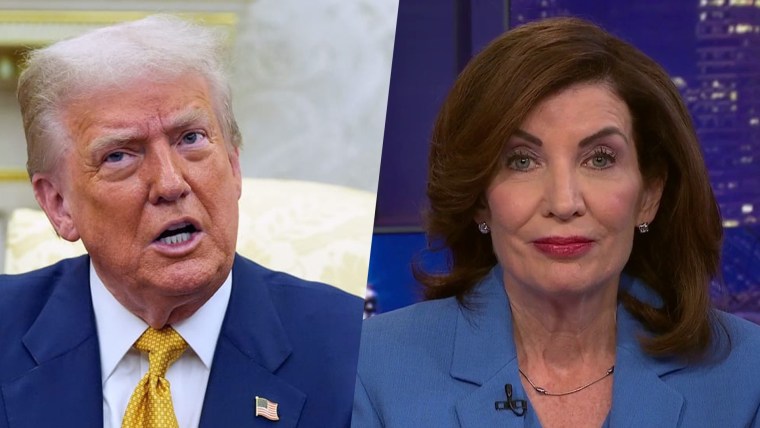California Gov. Gavin Newsom and New York Gov. Kathy Hochul are crafting plans to fight back against President Donald Trump’s push for a radical gerrymandering scheme in Texas, which would help rig the 2026 midterm elections in favor of the GOP.
This sign of resistance from the Democratic establishment means Democrats appear to be warming up to the idea of fighting dirty to beat back Trump’s exploitive agenda. But it’s also making clear that matching Trump’s energy could easily push democratic norms in the country backward for everyone.
If Democrats decide to go tit-for-tat with Trump on redistricting, it could be polarizing, but they wouldn’t be accused of being soft.
This summer Trump pressured Texas Gov. Greg Abbott and Texas’ Republican state legislators to redraw congressional district lines to make it easier to secure new Republican seats in the state. Texas Republicans obeyed. As The New York Times reported, Republican lawmakers released a draft map last week that “all but erased three urban Democratic seats and forced two other incumbents in South Texas into more Republican terrain.” Abbott called a special session of the Legislature to vote the map into law, but Democratic lawmakers fled the state to deny the Legislature a quorum and freeze the process.
Partisan gerrymandering — drawing up districts to give an advantage to one party — is, unfortunately, normal across many states. But the specific kind of gerrymandering that Texas is pursuing at Trump’s beckoning is different. Typically states redraw their districts at the beginning of every decade after the U.S. census provides new population data — and Texas already gerrymandered its districts at the beginning of the decade. As UCLA law professor Richard Hasen wrote for MSNBC, this effort at an additional mid-decade gerrymandering effort is a naked power grab: “The Department of Justice sent a laughably weak letter to Texas claiming that the state had to redistrict because its earlier redistricting plans were unconstitutional racial gerrymanders,” he wrote. That in turn gave it a convenient pretext to try to manufacture five new seats for the GOP ahead of Trump’s midterms.

Now Newsom and Hochul are threatening to retaliate with their own partisan gerrymandering agendas to offset Texas’ political scheme. “I’m tired of fighting this fight with my hand tied behind my back,” Hochul said this week. But their plans aren’t simple, and they come with tradeoffs.
Unlike Texas, California has an independent redistricting commission, which is a bipartisan panel designed explicitly to block partisan gerrymandering. That means Newsom would have to find a way to circumvent the commission to try to offset Texas with his own partisan gerrymandering. Here’s how that would work, according to NBC News:
Newsom hopes to work with the Democratic-dominated Legislature starting this month to set up a special election for a statewide ballot measure on Nov. 4. It would offer a newly drawn map if Texas moves forward, a source close to Newsom told NBC News. The ballot measure would do two things: First, it would affirm support for California’s independent commission and call for fair redistricting nationwide. Second, it would include a trigger that says a pre-drawn new House map expected to boost Democrats would take effect if Texas implemented a new map.
That’s a heavy lift, both politically and procedurally speaking. In a special election Newsom would have to convince Californians that he opposes partisan gerrymandering — but deserves the authority to do it anyway as a defensive political measure. And as NBC News reports, “any new House map would be constrained by the Voting Rights Act, as well as the governor’s office and the Legislature, which would need to greenlight it.”
Former California Gov. Arnold Schwarzenegger, who oversaw the state constitutional amendments that put the independent commission into place, said he’ll fight Newsom’s measure. Some of the state’s Democrats seem skeptical of Newsom’s plan. He could face legal challenges over the effort.
Hochul’s effort would be likely to take more time — and take effect after the midterms. New York also has its own independent redistricting commission, and NBC News reports that “changing the redistricting process must move forward as a legislatively referred constitutional amendment — a lengthy and arduous exercise that probably wouldn’t lead to new congressional maps until the 2028 election cycle, even if Texas acts before the upcoming midterms.”
Some other Democratic governors, including JB Pritzker of Illinois, haven’t ruled out their own retaliatory gerrymandering efforts.
Democratic voters have been expressing sharp disapproval of their own party for its meekness in the face of Republican extremism, and clamoring for a party willing to fight more fiercely to protect democracy. Retaliatory gerrymandering would seem, on one level, to fit the bill. Democrats have generally insisted on adhering to norms and declined to use every procedural tool at their disposal to slow down the Republicans in Congress. If Democrats decide to go tit-for-tat with Trump on redistricting, it could be polarizing, but they wouldn’t be accused of being soft.
At the same time, there’s no way for Democrats to avoid losing something in the process. It’s awkward to fight for democracy while simultaneously mirroring Trump’s efforts to effectively disenfranchise voters. A group can champion principles most credibly by holding on to them, even when they’re inconvenient. And it’s not even clear that such efforts would be politically “necessary”: historical trends suggest Democrats could have a wave election in 2026, and, as Hasen notes, Texas’ redistricting ambitions could also backfire by diluting some Republican districts. The Republican plan is insidious — but it’s not guaranteed to work.
The reality is there is no good option for Democrats. Unilaterally disarming against Trump as he pursues an autocratic agenda could be disastrous. But mimicking his antics also comes with costs and political risks, and could unravel valuable long-term efforts across many states to support independent redistricting. The conundrum speaks to the corrosive effect of living under a president who thinks rules are meant to be broken.

